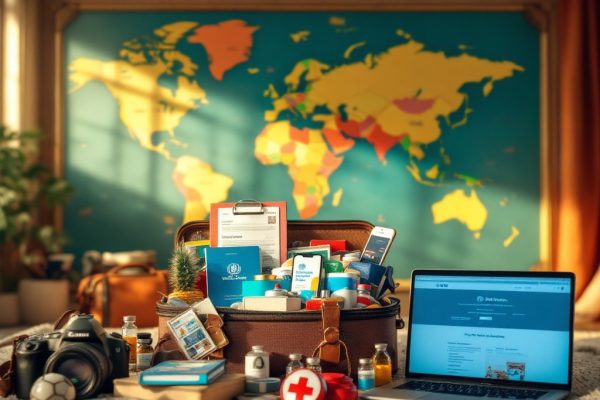What Vacciness are Needed to Travel To South Africa
Dreaming of a South African safari? Before you go, ensure your health is protected! This guide outlines recommended vaccinations for travelers to South Africa, including routine immunizations like MMR and DTaP, as well as crucial information on yellow fever requirements. Protect yourself from malaria in high-risk areas like Kruger National Park by consulting your doctor about preventative medication and other precautions. Learn more to ensure a safe and healthy adventure!
Important information

- Routine vaccinations (MMR, DTaP, chickenpox, polio, and annual flu shot) are recommended for all travelers.
- Hepatitis A and B, typhoid, and rabies vaccines are generally recommended.
- Yellow fever vaccination is mandatory if arriving from a yellow fever risk country. Proof of vaccination via an International Certificate of Vaccination or Prophylaxis (ICVP) is required. Travelers from low-risk countries aren’t required to have the vaccine but should have their ICVP.
- Malaria is a risk in northeastern South Africa, particularly around Kruger National Park. Consult your doctor about preventative medication, insect repellent, and mosquito nets.
- Consult your doctor at least four weeks before your trip to discuss your itinerary and personalized vaccination recommendations.
Recommended Vaccines for Travelers to South Africa
Plan your South African adventure and ensure your routine vaccinations are up-to-date. This includes the MMR (measles, mumps, and rubella) vaccine, DTaP (diphtheria, tetanus, and pertussis), and the chickenpox (varicella) and polio vaccines. A yearly flu shot is also recommended. Consult your doctor at least four weeks before departure to discuss any additional vaccines or medications you might need. Hepatitis A and B vaccines are generally recommended for travelers, as are typhoid and rabies vaccinations. If you are traveling from a region with a yellow fever risk, proof of yellow fever vaccination is mandatory.
Routine Vaccinations
Stay informed about necessary vaccinations to protect your health. Keep your immunizations current, including the MMR vaccine (measles, mumps, and rubella), DTaP (diphtheria, tetanus, and pertussis), varicella (chickenpox), and polio. A yearly flu shot is also advised. These vaccinations offer protection against diseases common in South Africa, helping to ensure your well-being.
Influenza Vaccination
Planning a trip to South Africa? Getting a flu shot is a smart precaution against seasonal influenza.
Hepatitis A and B Vaccines
Planning your South African adventure? Safeguard your health by consulting the CDC’s recommendations on vaccinations for hepatitis A and B. Hepatitis A is transmitted through contaminated food and water, a significant risk for travelers. The CDC advises vaccination against hepatitis A to mitigate this risk. While hepatitis B vaccination is recommended for all travelers, it’s especially important if you haven’t received it yet. Ensure a healthy and safe trip by taking these precautions.
Typhoid Vaccine
Planning a trip to South Africa? The CDC advises typhoid vaccination due to potential exposure. Consult your doctor for personalized recommendations to ensure a safe and healthy journey.
Rabies Vaccine Consultation
Your doctor will assess your rabies risk after your trip to South Africa by reviewing your itinerary and activities. Based on this evaluation, they will determine if pre-exposure rabies vaccinations are necessary as a preventative measure.
Yellow Fever Vaccination Requirements
Traveling to South Africa? Here’s what you need to know about yellow fever vaccination requirements:
Arriving from a High-Risk Country
If you are arriving from a country with a risk of yellow fever, you must present a valid yellow fever vaccination certificate. This is crucial for entry into South Africa, particularly if you are traveling from regions in Africa or South America where yellow fever is present. Failure to provide a valid certificate could result in quarantine or denial of entry.
Arriving from a Low-Risk Country
If you are arriving from a country with no risk of yellow fever, you are not required to have the vaccination. However, it is always recommended to carry your International Certificate of Vaccination or Prophylaxis (ICVP), as it serves as official documentation of your vaccination history.
Your ICVP is essential travel documentation. If you have a medical condition that prevents you from receiving the yellow fever vaccination, obtain a valid exemption certificate. Be sure to present this certificate upon arrival in South Africa, especially if you are coming from a high-risk area.
Yellow Fever Risk Countries
Traveling from a yellow fever-risk zone? If you’re coming to South Africa from a region with yellow fever, such as parts of Africa and South America, you must present your International Certificate of Vaccination or Prophylaxis (ICVP) upon arrival. This document confirms your yellow fever vaccination and is essential to ensure smooth entry into the country. Failure to provide this certificate could result in quarantine or denial of entry.
Proof of Vaccination and Exemption Certificate
Planning a trip to South Africa? If you are traveling from a yellow fever-risk country, you will need a vaccination certificate. Travelers arriving from low-risk areas may need an exemption certificate. Check the latest travel advisories for the most up-to-date information to ensure a smooth trip.
Malaria Precautions for South Africa
Planning a trip to northeastern South Africa, particularly areas like Kruger National Park? Be mindful of the malaria risk. Consult your doctor about your itinerary and travel plans to receive personalized advice and recommendations for protective measures. They can recommend appropriate insect repellents, mosquito nets, and other preventative measures. For high-risk areas, your doctor might suggest malaria prevention medication (chemoprophylaxis). Discuss the best options, including dosage and treatment duration, based on your individual health needs and travel plans.
Health Advice on Malaria Risk Areas
Planning a trip to a malaria-risk area in South Africa, such as Kruger National Park in the northeastern region? Consult your doctor about the right malaria prevention pills and dosage for your trip. Beyond medication, protect yourself from mosquito bites by using insect repellent and sleeping under mosquito nets. These precautions are essential for your health and safety.
Consult your doctor. Discuss the appropriate malaria prevention pills and dosage for your specific trip.
Use insect repellent. Apply insect repellent regularly to exposed skin to deter mosquitoes.
Sleep under mosquito nets. Use a mosquito net while sleeping to provide an additional barrier against bites.
Malaria Chemoprophylaxis
Planning a trip to South Africa? If you’re traveling to the northeast, especially around Kruger National Park, be aware of the malaria risk. Consult your doctor about suitable medication and dosage for protection.
Entry/Exit Requirements for Travelers
If you are traveling from a region with yellow fever, carry your International Certificate of Vaccination or Prophylaxis (ICVP). Border officials might ask to see this proof of vaccination.
International Certificate of Vaccination or Prophylaxis (ICVP)
An International Certificate of Vaccination or Prophylaxis (ICVP) is required for certain vaccinations, such as yellow fever. This is necessary if you are traveling from a country with a risk of yellow fever transmission.

















